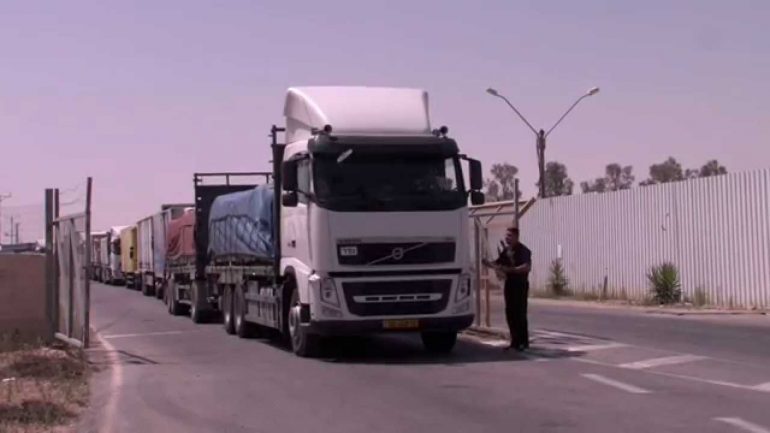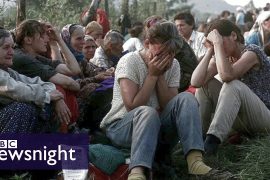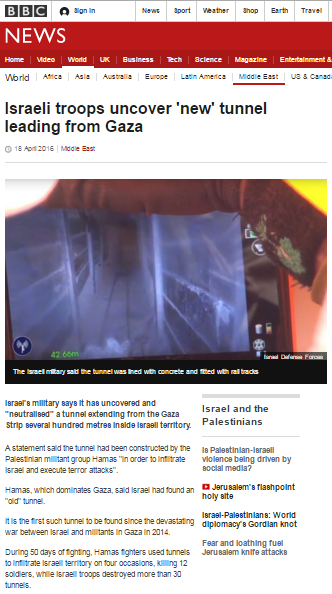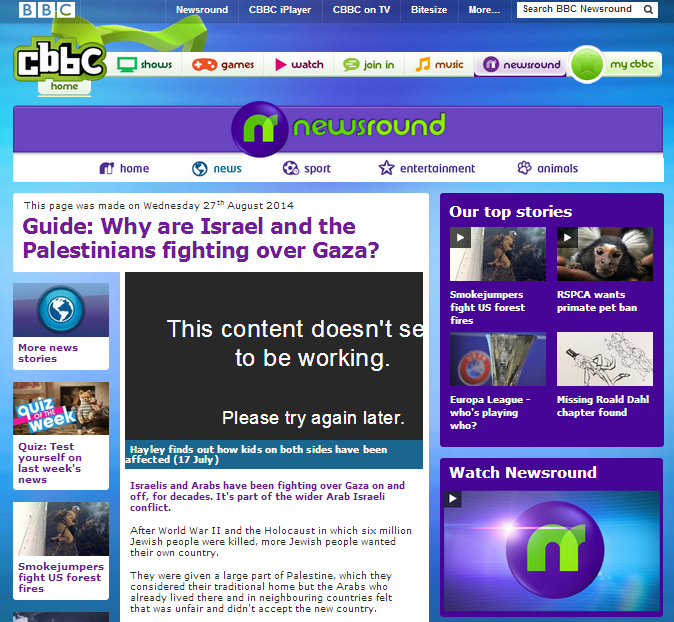Between the commencement of Operation Protective Edge on July 8th and the beginning of the 72-hour ceasefire on August 5th, Israel transferred 1,856 trucks carrying 40,550 tons of supplies via the Kerem Shalom crossing into the Gaza Strip, including 37,178 tons of foodstuffs, 1,694 tons of humanitarian goods and 1,029 tons of medicines and medical supplies.
On August 8th, the BBC’s Wyre Davies (recently brought back to the region from his South America post and currently supposedly covering the Israeli side of the story) visited Kerem Shalom and produced a filmed report for BBC television news programmes which also appeared on the BBC News website under the title “BBC reports from blockaded Israel-Gaza border crossing“.
Davies elected not to confuse his viewers with the above statistics.
“This is the Kerem Shalom border crossing between southern Israel and Gaza. In fact we’re stood in – effectively – in no man’s land now. Israel over there, Gaza over there. And this is the main crossing for goods into Gaza itself. As you can see behind me, these are Gazan lorries picking up basic foodstuffs, some aid and other produce which will now then go into Gaza itself. It’s not very much and certainly it isn’t enough to feed over a million people in Gaza.”
Davies makes no effort to explain to viewers that in fact there is no limit on the entry of goods into the Gaza Strip with the exception of dual-use goods which can be (and are, as the discovery of 32 cross-border attack tunnels in the past few weeks has shown) used for the purposes of terrorism. He also fails to inform them that the Kerem Shalom terminal is in fact capable of handling larger volumes of goods than is currently the case or why that is:
“Israel has invested 80 million ₪ [shekels] to expand Kerem Shalom to accommodate up to 450 trucks daily. However, due to demand on the Palestinian side, the average number of trucks that enter Gaza each day remains between 300- 350.” [emphasis added]
Davies continues:
“And it’s the lifting of this regulated blockade which is of course one of Hamas’ main reasons and one main reason why Hamas says it will not extend the truce, the ceasefire, which lasted for 72 hours.”
What Davies’ reference to “one of Hamas’ main reasons” is supposed to mean is not clear, but certainly viewers could not be blamed for misinterpreting that as meaning that Hamas launches missiles at Israeli civilians because of the restrictions on the entry of certain goods into the Gaza Strip. The reality, of course, is that Hamas’ terrorism brought about those restrictions – not the other way round – but Davies fails to make that fact adequately clear to viewers, as has been the case in all BBC reporting on the topic of the blockade to date. Davies later says:
“There are peace talks currently ongoing brokered by Egypt in Cairo, but the two sides are still very far apart. While Hamas wants an end to this blockade of Gaza, Israelis want to demilitarise Gaza itself. But those are both proposals that neither side is prepared to countenance for now. So even if this temporary truce continues and does last for another week, month or even a year, the expectation is of course there will be another conflict at some point between Israel and Hamas over Gaza.”
Davies’ presentation of Hamas’ demand to lift border restrictions as being on a par with Israel’s proposal to demilitarise the Gaza Strip seriously misleads audiences. Not for the first time, this BBC report fails to inform audiences that according to existing agreements between Israel and the Palestinian Authority (1995 Israeli-Palestinian Interim Agreement on the West Bank and the Gaza Strip) :
“Except for the Palestinian Police and the Israeli military forces, no other armed forces shall be established or operate in the West Bank and the Gaza Strip.”
And:
“Except for the arms, ammunition and equipment of the Palestinian Police described in Annex I, and those of the Israeli military forces, no organization, group or individual in the West Bank and the Gaza Strip shall manufacture, sell, acquire, possess, import or otherwise introduce into the West Bank or the Gaza Strip any firearms, ammunition, weapons, explosives, gunpowder or any related equipment, unless otherwise provided for in Annex I.”
Annex I states:
“In the Gaza Strip, the Palestinian Police will possess the following arms and equipment:
(1) 7,000 light personal weapons;
2) up to 120 machine guns of 0.3″ or 0.5″ caliber; and
(3) up to 45 wheeled armored vehicles of a type to be agreed on between the two sides, and of which 22 will be deployed in protecting Council installations. The use of wheeled armored vehicles in the Security Perimeter, on the Lateral Roads and on their adjacent sides, or in the vicinity of the Settlements shall be approved through the relevant DCO. Movement of such vehicles along the central North-South road (Road No. 4) in the Gaza Strip may take place only after providing notification to the relevant DCO.”
Article XV of the same treaty states:
“Both sides shall take all measures necessary in order to prevent acts of terrorism, crime and hostilities directed against each other, against individuals falling under the other’s authority and against their property and shall take legal measures against offenders.”
In other words, by requesting the demilitarization of the Gaza Strip, Israel is in fact pressing for adherence to existing agreements – signed by the Palestinian Authority and brokered by the international community – which Hamas has breached. An understanding of that point is of course crucial to BBC audiences’ ability to understand the conflict as a whole and efforts to end this particular round of hostilities in particular. Audiences have not been provided with that information to date; had they been, they might also have better understood some of the background behind Davies’ next inaccurate statement.
“There have been four conflicts – four wars – over Gaza in the last ten years and the two sides are fundamentally very far apart.”
Those conflicts have not been “over Gaza” but escalations caused by Hamas’ continuous terrorism against Israeli civilians. Davies is not the first BBC correspondent in recent days to use the ‘four wars in ten years’ theme but audiences have at no point been informed that in fact, the residents of southern Israel have been under attack from thousands of missiles fired from the Gaza Strip since 2001.
In addition to that filmed report, Davies also produced a written version titled “After the Gaza ceasefire: Hyper-tense and under fire” which appeared on the BBC news website’s Middle East page on August 8th.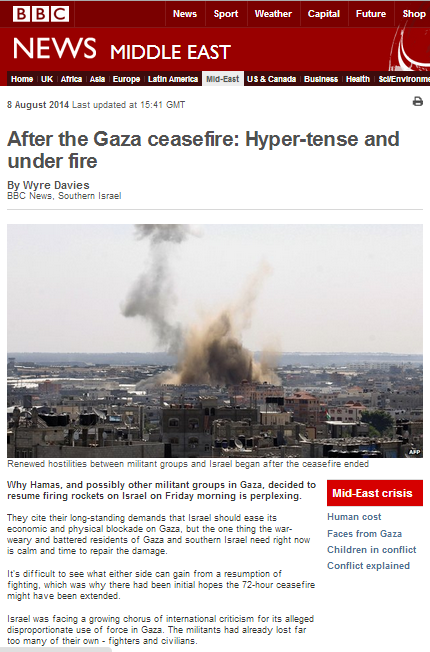
That article’s opening lines give some insight into the lack of understanding of what Hamas is and what its aims are in BBC circles: Davies is apparently under the impression that Hamas has the welfare of the residents of the Gaza Strip at heart.
“Why Hamas, and possibly other militant groups in Gaza, decided to resume firing rockets on Israel on Friday morning is perplexing.
They cite their long-standing demands that Israel should ease its economic and physical blockade on Gaza, but the one thing the war-weary and battered residents of Gaza and southern Israel need right now is calm and time to repair the damage.”
Much of that article too joins the mounting list of BBC content produced in the last few weeks which is devoted to context-free promotion of Hamas’ demands regarding the border restrictions.
“But, that perhaps, is part of the Hamas strategy.
They don’t want Israelis to feel safe or comfortable as long as the blockade of Gaza continues (and the Israeli occupation of the West Bank and East Jerusalem).
While Gaza’s 1.8 million inhabitants live, penned in, barely able to make a living – so the argument goes – why should Israelis just across the fence feel any more secure?”
Hamas’ issues with Israel of course extend far beyond any “blockade” or “occupation”, but Davies makes no attempt to inform readers of the terror organisation’s end game and stays equally mum on the topic of the Gaza Strip’s (or more accurately, Hamas’) affluent classes. He continues:
“…there’s also a realisation there will be another conflict in two or three years if the fundamental issues behind this crisis aren’t addressed.
For Hamas and its supporters in Gaza, that means lifting the blockade.
At the Kerem Shalom crossing I saw several truckloads of food, blankets and aid being transferred onto trucks on the Gazan side.
That trade (and aid) continued throughout the month-long conflict, but Gazans say it is nowhere near enough. They say they are completely dependent on what Israel decides to allow in and, for now, there are severe restrictions on building materials, concrete and other basics.
The reason for that, argues Israel, is obvious – while those materials are potentially used to build tunnels and other militant infrastructure, they’ll not be allowed in.
For Israel, the goal is peace and quiet and that means a demilitarised Gaza – something that Hamas won’t countenance in the present climate.”
There has been much promotion by the BBC of the topic of future ‘more of the same’ conflicts but no clear picture has been presented to BBC audiences with regard to the fact that Hamas’ demand to lift border restrictions – so vigorously and enthusiastically promoted by the BBC – is rooted not in concern for the welfare of the ordinary man, woman and child on the Gaza street, but primarily in the need to replenish and upgrade its weapons stocks precisely so that it can continue to instigate future conflicts in accordance with its ideology.

